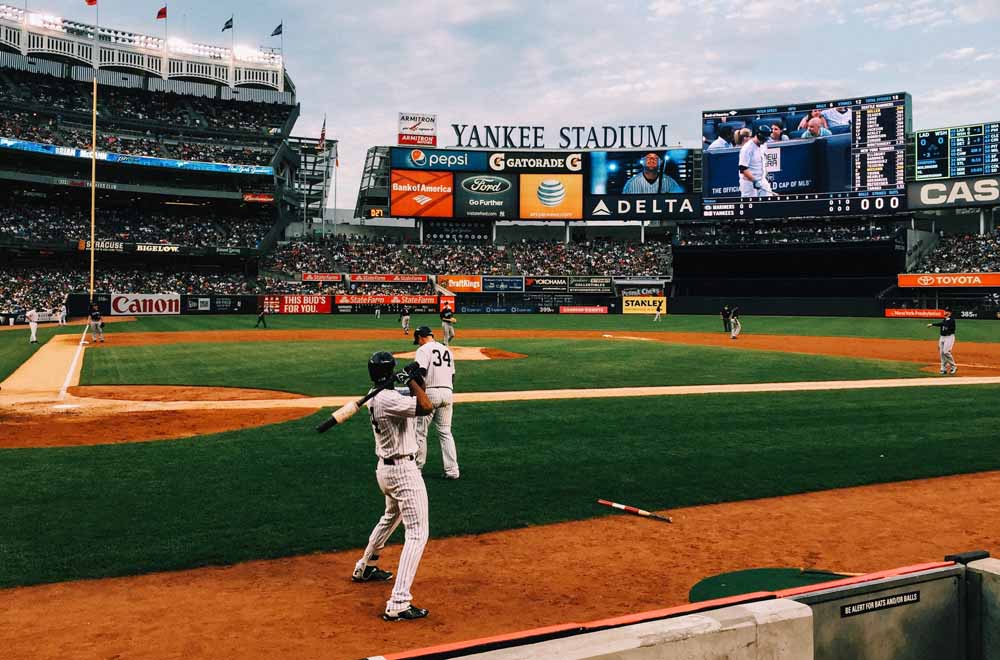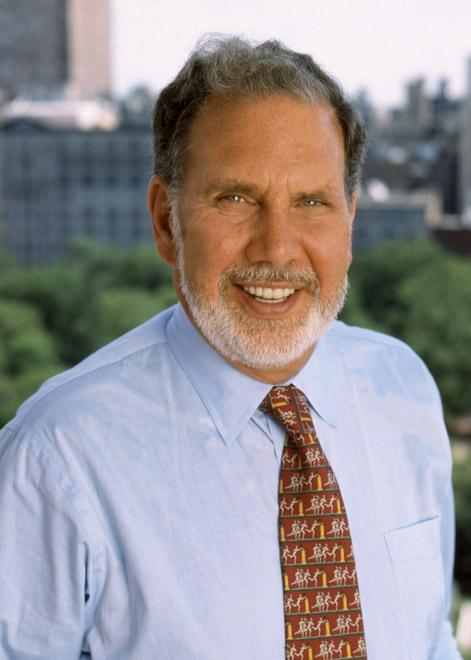
Yankee Stadium, in the Bronx borough of New York City (Unsplash/Chanan Greenblatt)
John Sexton, the former president of New York University, is a man of wide-ranging interests. He has a religion doctorate, is an academic lawyer and he served in university administration at NYU for over 25 years, teaching a full course load despite his demanding leadership responsibilities. He's also an enormously devoted baseball fan. Bringing a number of his passions together, Sexton starting teaching a course called "Baseball As a Road to God" in the early 2000s, which he adapted into a book in 2013. In anticipation of the start of baseball season, during which our beloved New York Yankees are hoping for a return to championship form, Sexton and I talked on the phone about what makes baseball a compelling venue for encountering the divine. Our conversation has been edited for length and clarity.
Laskey: You use the word "ineffable" a lot, referring to the idea that in baseball, different things can happen to those who play or watch that are hard to describe with words. What do you think about baseball in particular as a game that lends itself to opportunities for the breaking through of the sacred into the profane?

John Sexton (Law.nyu.edu)
Sexton: Simply naming the phenomenon of "the ineffable," it turns out, is much more of an advance and a revelation for contemporary students and others than I would've thought it was. Because we live in such a hyperstimulated world, there's not a lot of attention paid to the ineffable, even as one has ineffable experiences. Because we never stop to reflect upon our experiences sufficiently.
So, bringing to the consciousness that science and religion are two different magisteria — that one can simultaneously believe in both — seems remarkable, far more remarkable than I would've thought — to many people. Calling people to encounter the ineffable once you've named it becomes an interesting process and it turns out that baseball — precisely because of some of the things that the casual fans think of as weaknesses — is a perfect tool to do that calling.
For example, the fact that it is slow — or at least appears to be slow — invites you to a different kind of time. And you begin to, as the world slows, notice things you previously had missed. And then, all of a sudden, you begin to notice how much is going on that you didn't see before. And then you begin to notice that a lot of the action is going on when the ball is not in play; it goes on between pitches. All of the processes of thought, for example: what pitch to throw, where people position themselves, whether the runner goes, whether you bunt or not — all of those things become part of what ends up being a very deep universe that appears on the surface to the casual observer as being in a state of inactivity when, in fact, there's a lot of activity going on. Baseball allows for the development of skills of observation of deeper elements in things, which then translates back very nicely into religious contemplation. So I think that baseball works in this regard.
You hit on some points there that are timely, given the discourse around baseball and the pace of play, which is being debated. There have been some rule changes that have been introduced in the minor leagues this year, in attempt to try to capture a younger audience, I think. Are there some parallels to what the Catholic Church is doing, asking how do we reach the next generation and keep them from turning to other things? In the minor leagues this season, extra innings will start with a runner on second base, for instance.
You were talking earlier about the hyperstimulation in our society right now, which reminded me of this tweet by theologian Greg Hillis: "It's amazing to me that, with all this talk about pace-of-play in baseball, everyone is talking as if baseball is broken, and not as if there's something wrong with a society of people who can't enjoy leisure for 3 hours."
Do you have a reflection on these new changes or leisure in general or, in a religious sense, Sabbath?
I was at a lecture by Lord Jonathan Sacks, the former chief rabbi of the United Hebrew Congregations of the Commonwealth just the other day, and in it, he was talking about what one might do to help the youth of today become more complete human beings, and, quoting a set of texts from psychologists, he led us down a path where what was needed was the reservation of roughly a day a week for contemplation, and then obviously what suggested itself was just naming that the Sabbath.
It's amazing in this world how we resist that notion of setting aside time that's special in terms of family — you see young people setting aside date nights but then they go to restaurants where there's so much noise you can't talk or hear each other. And they end up on their cell phones. I think that if you have a differentiated structure as baseball does, you should give it, in a way, a concession to contemporary society. Because it may well be that those elements are strengths, that by going countercyclical that will, in the long run, differentiate you and give value to people who come to appreciate it.
I'd be very, very careful about conceding to this hyperstimulated society too quickly if I were running baseball. Now I'm not saying you don't tamper with anything. I'm not that hardbound a traditionalist. But something jumps in my blood pressure when I hear about extra innings starting with runners on second base. Pretty soon we'll be down to the baseball equivalent of shots on goal after overtime. Anybody that's been through the ecstatic experience, especially in the playoffs but even in the regular season, of an extra-inning game and the dimension that that brings to the depth of the experience — anybody who has really gotten that would find it very lamentable to have it shortened so that we hit certain television yardsticks.
A big piece of baseball in my own life is being part of this tradition that gets taught and lovingly handed on. I still have the very strong recollection of going to my first Yankees game when I was 5 years old and seeing that outfield grass for the first time down the tunnel to our seats. That was such an important gift I was given. I do feel that is one beautiful thing about baseball and other sports — this gift that gets passed the way that our faith was a gift that gets passed along as well.
One of the great things about baseball is that it is intergenerational. You become a Yankee fan or a Red Sox fan or a Brooklyn Dodger fan almost by heritage. And then one sees that the same thing is true of religion. A lot depends on where you're born and to whom. That is a lever that then allows you to see the triumphalist claims of the various major religions in a different way. Because it's self-evident that the triumphalist claims of baseball are solely the product of the fact that you're in this particular silo. And if you can come to an ecumenism about baseball, where even a Yankee fan can see the joy and passion and spirituality that a Red Sox fan brings to the game.
That's asking a lot!
It is asking a lot, but it's easier than asking many Christians to see wisdom in a Muslim. But if you're able to do it in baseball, and you see that structurally it's the same question, then that can be very helpful in bringing us together.
I live maybe 10 minutes from the Phillies stadium, and I have two young daughters, and I would never bring them to a Phillies game before bringing them to the Bronx! This is something that is within me. I don't even want them to go to the Phillies park before they have gone to the most important park!
You'd probably do the same thing by bringing them to a church before bringing them to a mosque.
Certainly. Still, I try to feel grateful for the gift, something that was passed down on both sides of my family, something that we enjoy together that connects me to those who have gone before me, and there's something beautiful about that. My brother is a Mets fan somehow. He broke out — he's the only one on either side of the family.
This happens even in the great religions. But the nice thing about baseball is that with some very, very rare exceptions, we tend not to turn to violence over the differences among Yankee and Red Sox fans. We haven't yet fought a crusade or burned people at the stake because they're rooting for the wrong baseball team.
There's one player in the book you write about who's my favorite from my childhood Yankee era: Mariano Rivera, the great closer. He's a very religious person, an evangelical Christian from Panama. He talked about his single pitch, his cut fastball, this historically devastating pitch — he would describe that as a gift from God, as if he had been blessed especially with this and felt like he needed to use it to give glory to God.
Sport seems to be one of the last places in society where overt religiosity is common. It seems to me, say, U.S. Congress and sports are places where God is talked about so much more often than other arenas. How many congressmen are atheists? A handful, maybe.
Even the example you give is an interesting one because I would submit to you that the God of Mariano Rivera and the God of Mike Pence are very different Gods. The God of the athlete tends to be the loving, bestowing God — the partner God — and the God that we frequently see in our political rhetoric is an angry, punitive God. And I'm not so sure that the Halls of Congress invoke the notion of God with the same purity that the athlete invokes God.
Advertisement
In the book, you talk about the different saints and sinners in the game, including people who were great on the field but horrible people off it, like Ty Cobb. For the rest of us, who watch or play as amateurs or just enjoy following baseball: Can baseball make us better people? Especially during this incredibly polarized time in our country?
There are a lot of ways that baseball can make us better people. First of all, simply the exercise of playing or caring about baseball is an exercise in community. I think in these times in particular, the notion of a commonweal of a community is quite fragile. Cities are brought together by teams — and baseball teams in particular for some structural reasons: the fact that the game is played so many times over the course of a season, that every day there is a community event so to speak. Baseball invites us into a community. And then of course there's dimension of inviting us into the contemplative realm of spirituality that baseball brings. I don't think there's any question that it can elevate us.
If one thinks about the fall of 2001, right after the attack on the World Trade Center in September, baseball played a tremendous role in the healing of the nation. Of course, it suspended activity for a week, but when it resumed, it was a way for the entire nation, not just the cities that were involved, to come together around a common experience that wasn't this horrible experience that everyone had gone through on Sept. 11.
I remember not just as a Yankee fan, but as a citizen of the world and of the United States, hoping that the Yankees would win that World Series. Of course it went to seven games and they almost did. Baseball certainly served through the months of September and October as an important part of the healing process.
Here we are, these years later, in a place that's quite strange. We find ourselves divided into these political camps where reason has dropped out of political discourse. It's just a camp war between the reds and the blues. So here now enters baseball. And baseball, thankfully, slices in all different directions. We're adherents, but there are the politically red and blue up at Yankee Stadium, sitting next to each other, slapping five on a walk-off home run or the final pitch of a no-hitter.
At a time when Americans increasingly have lost faith and trust in everything — in every institution, in each other — there are very few places in our lives where we can unite in a community and really experience the joy of what it's like to be in that community together with human beings of all stripes. There are very few places where we can stand with our moral lever in order to move the world in the direction of hope and love, and baseball is one of them.
We're right now at the beginning of the season, when everyone's equal and we don't know what surprises are in store for us, and every game has to be played and nobody is pronounced a winner in the newspaper or the polls or in the Las Vegas odds. And right now everybody's got the capacity to visualize halcyon days that are ahead.
But most of all, whether it be to celebrate or to mourn, we're looking forward to a season where baseball fans will be communities, and that's a good thing. Maybe we can build out from that to restoring the notion of a community of America and the community of the world, a notion that's been under attack now for these last couple of years.
[Mike Jordan Laskey is the director of Life & Justice Ministries for the Diocese of Camden, New Jersey. He blogs for the Camden Diocese at camdenlifejustice.wordpress.com. Sign up for email updates for future articles in the series, The Gospel of Sports.]





